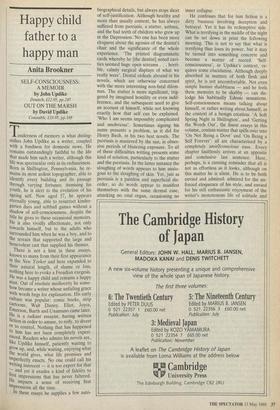Happy child father to a happy man
Anita Brookner
SELF-CONSCIOUSNESS: A MEMOIR by John Updike
Deutsch, £12.95, pp.245
OUT ON THE MARSH by David Updike
Constable, £10.95, pp.168
Tenderness of memory is what disting- uishes John Updike as a writer, coupled with a fondness for domestic news. He remains outstandingly faithful to the life that made him such a writer, although this life was spectacular only in its ordinariness. Born in Shillington, Pennsylvania, he re- mains its most ardent topographer, able to identify every building and its passage through varying fortunes: itemising his youth, he is alert to the evolution of his ageing self. Now aged 57, he appears eternally young, able to resurrect kinder- garten days and softball games without a shadow of self-consciousness, despite the title he gives to these occasional memoirs. He is also vividly affectionate, not only towards himself, but to the adults who surrounded him when he was a boy, and to the terrain that supported the large and benevolent cast that supplied his themes. There is not a hint in these essays, known to many from their first appearance In the New Yorker and here expanded to their natural length, of shame or loss, nothing here to evoke a Freudian exegesis. He was a happy child and remains a happy Man. Out of resolute mediocrity he some- how became a writer whose unfailing grace with words begs for explanation. His early culture was popular: comic books, strip cartoons, Walt Disney. Eliot, Joyce, Emerson, Barth and Unamuno came later. He is a radiant essayist, having written fiction in order to amuse, to reify, to divert or to control. Nothing that has happened to him has not been completely experi- enced. Readers who admire his novels are, like Updike himself, patiently waiting to grow up, and, while waiting, enjoying what the world gives, what life promises and imperfectly enacts. No one could call his Writing innocent — it is too expert for that ---- and yet it exudes a kind of fidelity to first impressions that has never faltered. He imparts a sense of receiving first impressions all the time. In these essays he supplies a few auto- biographical details, but always stops short of self-justification. Although healthy and more than usually content, he has always suffered from psoriasis, a stutter, asthma, and the bad teeth of children who grew up in the Depression. No one has been more eloquent about the agonies of the dentist's chair and the significance of the whole experience. 'The printed diagrammatic cards whereby he [the dentist] noted cavi- ties seemed huge open screams . . . horri- ble, calmly surgical displays of what we really were'. Dental ordeals abound in his novels, which are otherwise concerned with the more interesting non-fatal dilem- mas. The stutter is more significant, trig- gered by imagined hostility or even indif- ference, and the subsequent need to give an account of himself, while not knowing exactly how that self can be explained. `Who I am seems impossibly complicated and unobvious'. Sometimes signing his name presents a problem, as it did for Henry Bech, in his two best novels. The psoriasis is mastered by the sun, in obses- sive periods of blistering exposure. To all of these difficulties writing presents some kind of solution, particularly to the stutter and the psoriasis. In the latter instance the sloughing of words appears to him analo- gous to the sloughing of skin. Yet, just as psoriasis is a painless and superficial dis- order, so do words appear to manifest themselves with the same dermal ease, attacking no vital organ, occasioning no inner collapse.
He confesses that for him fiction is a dirty business involving deception and betrayal. Yet it has its redemptive side. What is terrifying in the middle of the night can be set down in print the following morning. This is not to say that what is terrifying thus loses its power, but it may be turned into something concrete and become a matter of record. 'Self- consciousness', in Updike's context, re- quires some elucidation. Although deeply absorbed in matters of both flesh and spirit, he is not uncomfortable. Not even simple human shabbiness — and he feels these memoirs to be shabby — can dis- lodge his habitually Edenic sensations. Self-consciousness means talking about himself, or rather writing about himself, in the context of a benign creation. 'A Soft Spring Night in Shillington', and 'Getting the Words Out', the finest essays in this volume, contain matter that spills over into `On Not Being a Dove' and 'On Being a Self Forever': all are characterised by a completely unselfconscious ease. Every chapter faultlessly arrives at an apposite and conclusive last sentence. Here, perhaps, is a cunning reminder that all is not as effortless as it looks, although on this matter he is silent. He is to be both envied and admired: admired for the un- forced eloquence of his style, and envied for his still enthusiastic enjoyment of the writer's monotonous life of solitude and regularity. He should be read by everyone who attempts to practise this obdurate craft.
His son, David, has produced a volume of stories that uncannily echo his father, except in objectivity. These fragments rarely detach themselves from a very real self-consciousness, but the ability is there, and the writing is both clear and wistful. Later experiences, not necessarily those shared with his father, may give his work a power which it presently lacks. But it is pleasant to see what has been handed on.



























































 Previous page
Previous page